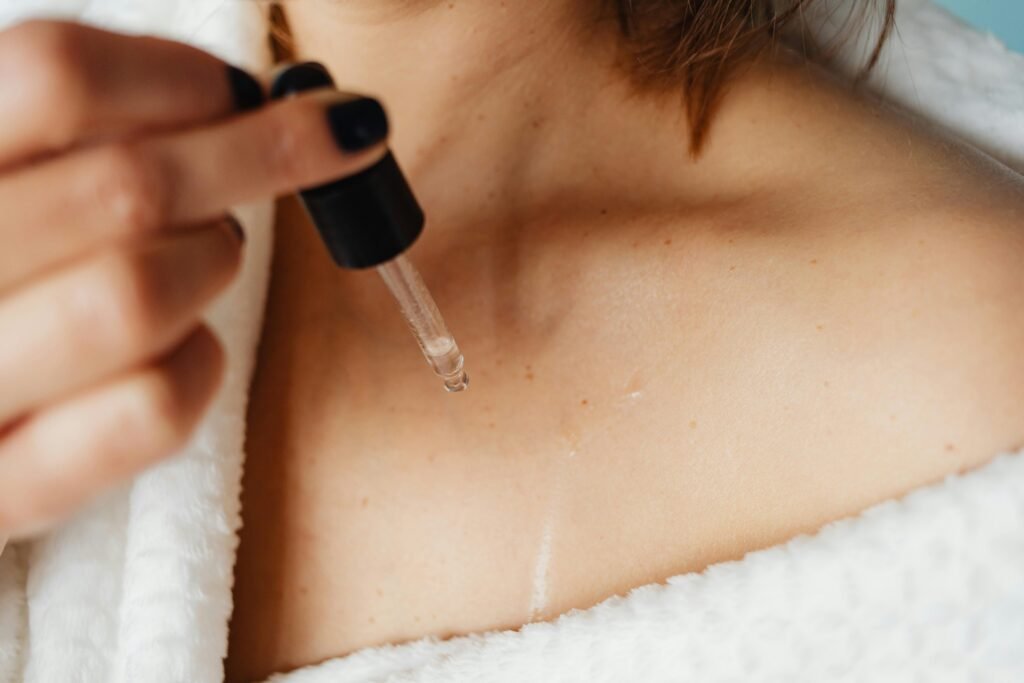If you have oily, acne-prone skin, you know the struggle—greasy T-zones, unexpected breakouts, and that constant shine that refuses to quit. But what if there was a skincare hero that could help balance oil production, calm breakouts, and give your skin that fresh, healthy glow? Enter niacinamide serum—one of the best skincare ingredients for oily, acne-prone skin.
What is Niacinamide?

Niacinamide is a form of vitamin B3, a water-soluble vitamin that works wonders on the skin. It plays a crucial role in strengthening the skin barrier, reducing inflammation, and regulating sebum (oil) production. Unlike some acne-fighting ingredients that can be drying or irritating, niacinamide serum is gentle and suitable for all skin types, especially oily and acne-prone skin.
How Niacinamide Serum Helps Oily Skin
If your skin tends to feel greasy just a few hours after cleansing, niacinamide is your new best friend. Here’s how it works its magic:
1. Regulates Sebum Production
One of the biggest challenges with oily skin is excess sebum, which can lead to clogged pores and breakouts. Niacinamide helps control oil production by signaling the sebaceous glands to produce just the right amount of oil—not too much, not too little. This means less shine and fewer clogged pores.
2. Minimizes the Appearance of Pores
Large, visible pores often come hand-in-hand with oily skin. While you can’t physically shrink your pores, niacinamide serum can make them appear smaller by regulating oil and improving skin elasticity. The result? Smoother, more refined skin texture.
3. Strengthens the Skin Barrier
A compromised skin barrier can lead to increased oiliness as your skin tries to compensate for moisture loss. Niacinamide strengthens the skin’s protective barrier, preventing water loss and ensuring that your skin stays balanced and healthy.
How Niacinamide Serum Fights Acne
Oily skin is more prone to acne, but niacinamide doesn’t just tackle oil—it goes a step further to help clear up breakouts and prevent new ones.
1. Reduces Inflammation
Inflammation is a major contributor to acne. Red, swollen pimples and irritated skin are all signs of inflammation, and this is where niacinamide serum shines. It has powerful anti-inflammatory properties that help calm redness and swelling, making acne look less angry and helping it heal faster.
2. Controls Breakouts Without Drying Skin
Unlike harsh acne treatments that strip the skin of moisture (looking at you, benzoyl peroxide and salicylic acid), niacinamide fights acne without drying out your skin. This makes it perfect for those who need a more balanced approach to acne treatment.
3. Helps Fade Acne Scars
If past breakouts have left behind dark marks or uneven skin tone, niacinamide can help. It inhibits the transfer of pigment within the skin, which helps fade post-inflammatory hyperpigmentation (those pesky dark spots left behind after a pimple heals). Regular use of niacinamide serum can lead to a brighter, more even complexion.
Additional Benefits of Niacinamide Serum

Aside from keeping oil and acne in check, niacinamide has other impressive benefits:
- Improves Skin Hydration – By boosting ceramide production, niacinamide helps retain moisture, keeping skin plump and healthy.
- Boosts Collagen Production – This helps improve skin elasticity and can reduce the appearance of fine lines over time.
- Protects Against Environmental Damage – Niacinamide has antioxidant properties that help defend the skin against damage from pollution and UV rays.
How to Use Niacinamide Serum for Best Results
If you’re new to niacinamide serum, here’s how to incorporate it into your skincare routine for maximum benefits:
- Cleanse – Start with a gentle cleanser to remove dirt and excess oil.
- Tone (Optional) – If you use a toner, apply it before your serum.
- Apply Niacinamide Serum – Use a few drops on clean skin, gently patting it in until absorbed.
- Moisturize – Lock in hydration with a lightweight, oil-free moisturizer.
- Sunscreen (Morning Routine Only) – Always finish with SPF 30 or higher to protect your skin.
Niacinamide works well with most other skincare ingredients, so you can safely use it alongside hyaluronic acid, peptides, and antioxidants. However, if you’re using strong actives like vitamin C or retinol, introduce niacinamide slowly to avoid potential irritation.
How Long Does It Take to See Results?
Like most skincare products, niacinamide isn’t an overnight fix. But with consistent use, you can expect to see improvements within 4 to 8 weeks. Oiliness and redness may start to decrease within the first few weeks, while dark spots and acne scars will take longer to fade.
Choosing the Right Niacinamide Serum
With so many options on the market, how do you pick the right niacinamide serum for your skin? Here’s what to look for:
- Concentration – A 5% concentration is ideal for most people. It’s effective yet gentle. Higher concentrations (10%) work well for stubborn oiliness and acne but may be too strong for sensitive skin.
- Additional Ingredients – Look for serums with soothing ingredients like zinc, hyaluronic acid, or panthenol to enhance hydration and calming effects.
- No Irritating Additives – Avoid products with alcohol, artificial fragrances, or harsh preservatives that can irritate your skin.
The Verdict: Niacinamide Serum is a Must-Have for Oily, Acne-Prone Skin
If your skin is constantly battling excess oil, breakouts, and enlarged pores, a niacinamide serum is a game-changer. It regulates sebum, reduces inflammation, clears acne, and even helps fade scars—all without drying out your skin. Plus, it’s gentle enough for everyday use and works well with most other skincare products.
So, if you’re tired of the endless cycle of greasy skin and breakouts, it’s time to give niacinamide a try. Your skin will thank you!
Frequently Asked Questions: Why a Niacinamide Serum is Good for Oily, Acne-Prone Skin
1. What makes niacinamide such a big deal for oily, acne-prone skin?
Niacinamide is like that chill friend who keeps everything under control without being too harsh. It helps regulate oil production, so your face doesn’t look like a grease pan by noon. But it doesn’t strip your skin dry, which is super important because over-drying can make your skin freak out and produce even more oil. Plus, it strengthens your skin barrier, making it less prone to irritation and breakouts. And let’s not forget—it fights acne-causing inflammation, helps fade dark spots, and even boosts hydration. Basically, it’s the multitasking ingredient your skin has been waiting for.
2. Will a niacinamide serum dry out my skin?
Nope, and that’s one of the best things about it! Unlike some acne treatments that can be super drying (looking at you, benzoyl peroxide and salicylic acid), niacinamide actually helps retain moisture. It works by supporting your skin’s natural barrier, which means less water loss and more balanced hydration. So even though it helps with oil control, it won’t leave your skin feeling tight, flaky, or desperate for moisturizer. If anything, it can make your skin feel more plump and healthy over time.
3. Can I use niacinamide if I already have active acne?
Absolutely. In fact, it’s a great addition to your routine if you’re dealing with breakouts. Niacinamide has anti-inflammatory properties, which means it can help calm down angry, red pimples and reduce the overall swelling that comes with acne. It also speeds up healing, so those annoying post-acne marks fade faster. And because it keeps oil production in check, it helps prevent future breakouts from popping up. Just make sure to pair it with a solid cleanser and a lightweight moisturizer to keep everything balanced.
4. How long does it take to see results from niacinamide?
Patience, my friend. Niacinamide isn’t an overnight miracle, but it does work steadily. You’ll usually start noticing a difference in your oil levels and overall skin texture within two to four weeks. If hyperpigmentation or acne scars are your main concern, it can take around eight to twelve weeks for more visible fading. The key is consistency—using it daily will give you the best results. And trust me, once you see how smooth and even your skin gets, you’ll wonder why you didn’t start sooner.
5. Can niacinamide replace my acne treatments?
Not necessarily, but it can definitely make them work better. Niacinamide isn’t an intense acne-fighting ingredient like salicylic acid or retinoids, but it does help with oil control, inflammation, and healing. If you’re dealing with mild to moderate acne, you might find that a good niacinamide serum is enough on its own. But if you have stubborn, cystic breakouts, you’ll probably still need stronger treatments. The good news? Niacinamide plays well with other acne-fighters, so you can easily add it to your routine without worrying about irritation.
6. What’s the best way to use niacinamide in my skincare routine?
Super easy—just use it after cleansing and before moisturizing. If you’re using a serum, apply a few drops on dry skin and let it sink in before layering anything else. It works great both morning and night, but if you’re using it during the day, don’t forget sunscreen. And if you’re wondering whether you can mix it with other ingredients, the answer is mostly yes! It pairs well with hydrating serums, vitamin C, and even exfoliating acids (just don’t go overboard).
7. Can niacinamide make my skin worse before it gets better?
Good news—it’s not one of those ingredients that causes purging, so you don’t have to worry about your skin freaking out. That being said, some people experience mild irritation or breakouts when they first start using it, but that’s usually because they’re using too high of a concentration too soon. If your skin is sensitive, start with a lower percentage (around 5%) and work your way up. Also, be mindful of what else you’re using—overloading your routine with too many actives at once can cause irritation, and your skin deserves a little breathing room.
